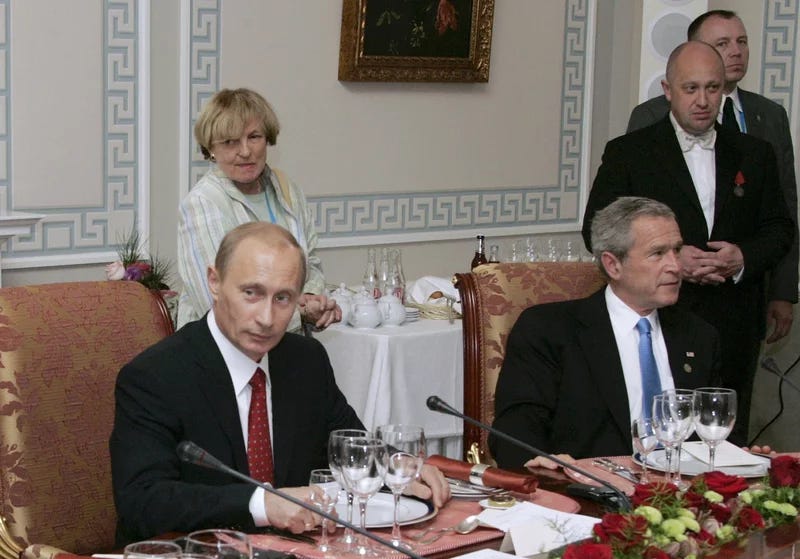The cooks, their wives, the thieves, and big brother
Chefs and tyrants: a culinary take on a failed coup
In a 2006, Russian President Vladimir Putin hosts U.S. President George W. Bush in St. Petersburg, Russia. Behind Bush, Yevgeny Prigozhin is keeping the courses coming. (CREDIT: Sergei Zhukov/AP)
In the end Yevgeny Prigozhin was just another servant. He might have led his forces to Moscow if he had more ambition and independence of spirit. His mutiny had revealed the ineptitude of Vladimir Putin’s intelligence services, who did not see the revolt coming, and the paralysis of Russia’s supposedly terrifying security apparatus. Prigozhin’s Wagner group had taken Rostov and Voronezh with barely a shot fired. The road to Moscow lay open.
But far from feeling exhilaration, Prigozhin was frightened by the vista ahead of him. He remembered his place as Putin’s chef, cut a deal and fled to Belarus.
For all Western culture’s celebration of celebrity chefs as rebel artists, a cook is still the hired help, and a cook for a tyrant must learn servility more than most.
In How to Feed a Dictator: Saddam Hussein, Idi Amin, Enver Hoxha, Fidel Castro, and Pol Pot Through the Eyes of Their Cooks, the Polish journalist Witold Szabłowski created an unforgettable account of arbitrary power as remembered by chefs.
He shows that a dictator’s cook has three roles: to impress their master, impress their master’s guests and protect their master from poisoning. Whether fear or love buys their loyalty, their master remains at the centre of their universe.
Putin made Prigozhin his high-class servant in the early 2000s. Putin, a political novice, wanted lavish banquets to impress his fellow heads of state, and Prigozhin obliged. He had to overcome food shortages and Russia’s reputation for abysmal cuisine. A fine job he made of it. Prigozhin “crafted elegant menus out of traditional ingredients,” the Economist reported. “When George W. Bush was in town, Prigozhin served up Astrakhan tomatoes and balsamic vinegar, crayfish with gooseberry marmalade and fried smelt with turnips and baby courgettes.”
Prigozhin moved on to serve Putin by running troll factories that subverted Western elections and mercenary forces that brought misery to the peoples of Syria, Mali and Ukraine.
But however much he raged like a Russian Gordon Ramsay he always retained the neediness of a servant who must impress his master.
As a point of comparison, look at Szabłowski’s account of the life of Idi Amin’s chef Otonde Odera. (I have taken it from the excellent English translation by Antonia Lloyd-Jones.)
Keep reading with a 7-day free trial
Subscribe to Writing from London to keep reading this post and get 7 days of free access to the full post archives.




